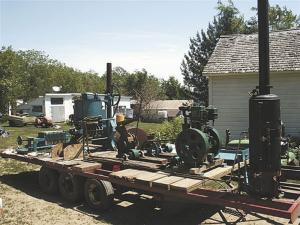2006 - Volume #30, Issue #5, Page #27
[ Sample Stories From This Issue | List of All Stories In This Issue | Print this story
| Read this issue]
Farm-Sized Portable Biodiesel Plant
 |
Using components imported from India and others produced locally, he has developed a turnkey biodiesel system that he expects to retail for about $12,000 (delivered). He has even mounted one on a trailer for portable demonstrations.
"I use a biomass-fired boiler to produce steam to heat the oilseeds," explains Byrnes. "The steam is injected over the top of the oilseeds and through a tube that runs around the bottom of the seed hopper."
Once heated, the oil seeds pass through a Goyim expeller powered by a biodiesel-fueled 12 hp, single cylinder Listeroid engine. It also powers the water pump on the steam boiler and the hammer mill to crush the beans before they are sent to the heated hopper.
As the extruder screw turns, oil drips into a belly tank and meal cake comes out the other end. Unwashed biodiesel oil (without glycerin removed) fires a 2-cylinder Onan 10 kW generator, while the meal is fed to his livestock. He is also burning 50 percent unwashed oil in his diesel truck.
So far the unwashed biodiesel has not been a problem for the generator, which Byrnes checks regularly, pulling injectors and watching for buildup. The byproduct from the process has been anything but a problem for his livestock.
"The meal cake is great," says Byrnes. "I just brought in 400 50-lb. pigs, and they love the expelled meal. It has the gums they don't get with commercial soy meal and no residual hexane or calcium additives."
Byrnes suggests farmers consider a system designed to meet farm needs, both in terms of power produced and livestock to be fed. "Figure how many gallons of biodiesel are needed for the farm," he says. "Then look at how many head of livestock will be needed to consume the meal. If you have to sell meal on the open market, you are too big. Then you are competing with ADM and Cargill."
Byrnes has recently assembled his biodiesel system on a trailer to demonstrate the system at farms, farm shows and other events. He notes that his demo unit can process up to three tons of soybeans and pull out 100 gallons of unwashed oil in a 24-hour day. He suggests that larger units need to have washing/refining systems added to bring the oil to commercial grade. He advocates farmers going together to build such plants to produce washed biodiesel for their own use. Of course, a unit like his mounted on a trailer could be shared and pulled to owner farms for periodic refilling of the diesel tank.
Byrnes reports that one group of Nebraska farmers is building a 20 ton/day plant for sunflowers. Instead of hauling sunflowers to buyers in Kansas, they plan to make their own biodiesel for use on the farm.
Contact: FARM SHOW Followup, Robert Byrnes, Nebraska Renewable Energy Systems, 113 N. Charde Ave, Oakland, Neb. 68045 (ph 402 685-5444; cell phone 402 307-0280; waterdog@nerenew.com; www. nebraskarenewableenergysystems.com).

Click here to download page story appeared in.

Click here to read entire issue
To read the rest of this story, download this issue below or click here to register with your account number.




